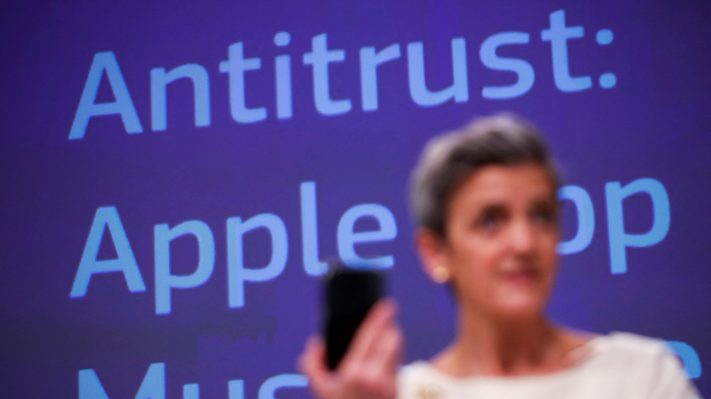EU antitrust regulators target Apple’s ‘anti-steering’ developer restrictions, but drop in-app purchases case

The European Commission (EC) has confirmed a previously-issued preliminary view that Apple’s so-called “anti-steering” practices, which prevent developers from informing users about alternative payment options, constitutes unfair trading practices.
However, in a refined Statement of Objections sent to Apple and published for the public today, the EC also said that it’s dropping an additional anti-trust charge against the tech giant around the issue of how Apple imposes its own in-app purchase (IAP) payment technology on music-streaming service providers. It wrote:
Today’s Statement of Objections clarifies that the Commission does no longer take a position as to the legality of the IAP obligation for the purposes of this antitrust investigation but rather focuses on the contractual restrictions that Apple imposed on app developers which prevent them from informing iPhone and iPad users of alternative music subscription options at lower prices outside of the app and to effectively choose those.
The story so far
The saga dates back nearly four years, when Spotify filed a complaint against Apple with the European Commission over alleged restrictive rules and what it referred to as an “Apple tax” — a fee that developers must pay Apple where in-app payments or subscriptions are involved.
The crux of the issue is that Spotify has to pay Apple a percentage of any subscriptions that it secures through Apple’s App Store, a fee that Spotify then has to pass on to its own customers — this effectively means that a Spotify subscription is more expensive when a consumer signs up through an iPhone or iPad than it is through Spotify’s own website. Moreover, given that Apple offers a competing service — Apple Music — Spotify argued that this puts Apple at an advantage, given that it can offer its own music-streaming service at a cheaper price.
On top of that, Spotify also took issue with the way that Apple prevents developers from informing consumers of alternative payment methods. For example, Spotify is prohibited from saying in its App Store description notes or in the app itself that users can sign-up for a monthly subscription for $3 cheaper through Spotify.com.
And it’s this second contention that the EC is now focusing squarely on.
In truth, not a great deal has happened in this case in the four years since Spotify filed its grievances. In April 2021, the EC issued a formal statement of objections against Apple with a preliminary view that Apple’s app store rules were indeed distorting competition in the music-streaming market by forcing rivals to raise their costs. A few weeks back, Spotify and a bunch of co-signatories including rival Deezer published an open letter to the EC’s Commissioner for Competition Margrethe Vestager, essentially asking them to hurry up with their decision.
While today’s announcement could be construed as progress of sorts, it still doesn’t signal anything close to a final decision. As the EC itself notes today, this is merely a “procedural step” that removes one of its previous areas of focus from its crosshairs — it replaces one Statement of Objections issued two years ago with a new Statement of Objections.
Legal wrangles
It is worth noting that Apple is facing legal challenges elsewhere over its IAP enforcement policy. In the Netherlands, Apple was hit with hefty fines after failing to comply with an order to allow dating apps to use alternative payment systems, though this was subsequently resolved after Apple offered concessions to allow alternatives. So today’s news that the EC is no longer concerning itself with in-app payments may come as a surprise to some.
That all said, this move was likely designed to expedite proceedings, and means that the EC believes it has a stronger case by focusing on Apple’s anti-steering efforts, which it says could breach Article 102 of the Treaty on the Functioning of the European Union (TFEU), which is concerned with preventing price-fixing and practices that promote monopolies.
In a statement issued to TechCrunch, Spotify’s general counsel Eve Konstan urged the EC to reach a speedy conclusion to this case.
“Today, the European Commission sent a clear message that Apple’s anti-competitive behavior and unfair practices have harmed consumers and disadvantaged developers for far too long,” Konstan said. “We urge the Commission to reach a swift decision in this case to protect consumers and restore fair competition on the iOS platform.”
Even when the EC reaches a final decision, though, there will likely be a lengthy appeals process where Apple will fight its corner. If, after that, the Commission sticks to its guns, it can impose a fine of up to 10% of Apple’s global turnover, which was nearly $400 billion last year. And of course, Apple would be forced to remove existing contractual obligations between it and developers, meaning that Spotify and similar companies may be able to link from their iPhone apps to subscription portals elsewhere.
“Apple will continue to work with the European Commission to understand and respond to their concerns, all the while promoting competition and choice for European consumers,” an Apple spokesperson said in a statement issued to TechCrunch. “We’re pleased that the Commission has narrowed its case and is no longer challenging Apple’s right to collect a commission for digital goods and require the use of the In-App Payment systems users trust. The App Store has helped Spotify become the top music streaming service across Europe and we hope the European Commission will end its pursuit of a complaint that has no merit.”


